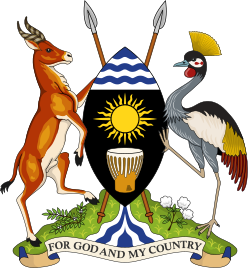 |
|---|
Judiciary
|
|
 |
|---|
Since independence from the United Kingdom on 9 October 1962, Uganda has had the following ministers of internal affairs:
| No. | Name | From | To | Head of state | Notes |
|---|---|---|---|---|---|
| - | G Oda | 1960 | 1962 | Benedicto Kiwanuka | Oda was minister under Prime Minister Benedicto Kiwanuka and the first to take the title of minister and not secretary. [1] He was Minister of Internal Affairs under the transitional government. |
| 1 | Cuthbert Joseph Obwangor | 1962 | 1964 | Apollo Milton Obote | Obwangor was Minister of Regional Administration which briefly assumed the responsibilities of the Ministry of Internal Affairs. [2] |
| 1 | Felix Kenyi Onama | Onama also can lay claim to the Minister of Interior position between 1962 and 1964, as he was Minister of Works and Labour. That role assumed some of the other responsibilities of the Minister of Interior like leading the police. [3] | |||
| 2 | Basil Kiiza Bataringaya | 1964 | 1971 | Basil Kiiza Bataringaya headed the newly created Ministry of Home Affairs, later renamed Ministry of Internal Affairs. He assumed the role after he flipped parties and joined the Obote administration. [4] | |
| 3 | Lt. Col. Ernest Obitre Gama | 1971 | 1973 | Idi Amin | [5] |
| 4 | Charles Oboth‐Ofumbi | 1973 | 16 February 1977 | [6] | |
| 5 | Paulo Muwanga | 1978 | 1980 | Yusuf Lule | |
| Godfrey Binaisa | [7] | ||||
| Presidential Commission of Uganda | [7] | ||||
| Paulo Muwanga | Paulo Muwanga became head of state briefly when the Presidential Commission of Uganda gave him the powers of the President of Uganda from 22 May to 15 December 1980, where he also was Minister of Internal Affairs. [7] | ||||
| 6 | John Mikloth Magoola Luwuliza-Kirunda | 1981 | 1985 | Apolo Milton Obote (Second Administration) | Dr. John M. M. Luwuliza Kirunda left the role when he became Foreign Minister [8] [9] |
| 7 | Paul Ssemogerere | 1985 | 1988 | General Bazilio Olara-Okello | Paul Ssemogerere left the position when he became Foreign minister [10] [11] |
| General Tito Okello | |||||
| Yoweri Museveni | |||||
| Paul Ssemogerere stayed on for the beginning of Yoweri Museveni's administration. [12] | |||||
| 8 | Kahinda Otafiire | 1988 | 1989 | Maj. Kahinda Otafiire had to resign as Minister of Internal Affairs after he brandished a pistol at a woman at a Kampala bar. [13] | |
| 9 | Ibrahim Mukiibi | 1989 | 1994 | [14] | |
| 10 | Crispus Kiyonga | 1994 | 1996 | ||
| 11 | Eriya Kategaya | 1996 | 2001 | ||
| 12 | James Wapakhabulo | 2001 | 2004 | Died in office | |
| 13 | Tom Butime | 2004 | 2005 | In acting capacity | |
| 14 | Hilary Onek | 27 May 2011 | 23 May 2013 | [15] | |
| 15 | Aronda Nyakairima | 23 May 2013 | 12 September 2015 | [16] | |
| 16 | Rose Akol | 13 November 2015 | 6 June 2016 | [17] | |
| 17 | Jeje Odongo | 6 June 2016 | Present | ||